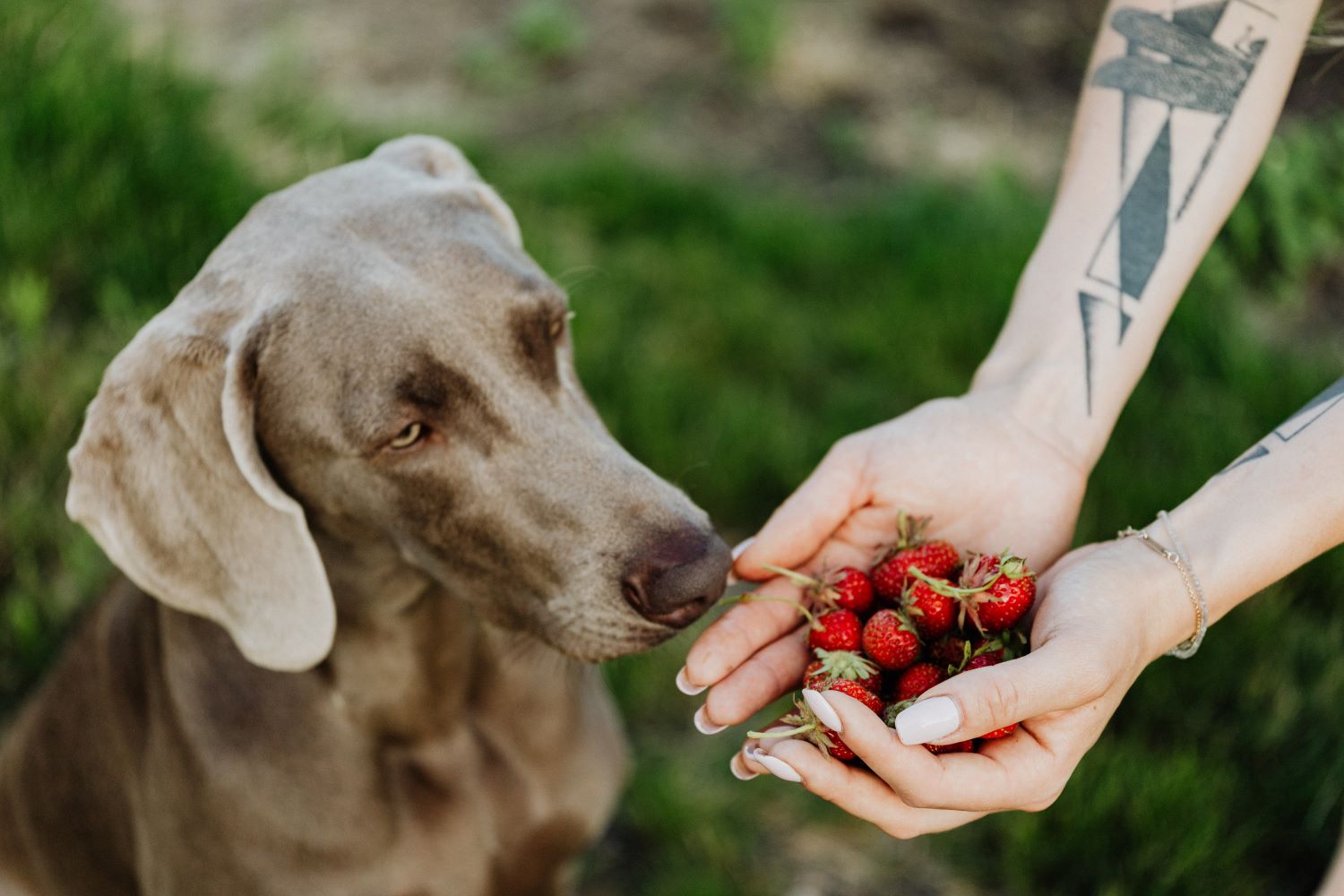Can dogs eat strawberries or should you think of another sweet treat for your pup?
If you enjoy sharing healthy snacks with your best friend as I do with my dog Pax, you’re probably wondering what fruits are safe for dogs and which ones are toxic.
While strawberries can be a delicious, nutrient-rich addition to a dog’s meal, there are several dos and don’ts you need to keep in mind before feeding them to your pup.
So if you’re interested to learn more about the health benefits of strawberries, how to safely feed them to your dog, and what strawberry dog treats you should stay away from, you’re in the right place.
Are strawberries good for dogs?
The answer is yes, strawberries are non-toxic and healthy for dogs if eaten in moderation. You can feed your dogs strawberries as a health-boosting snack because they’re low in calories and rich in essential nutrients.
Even though strawberries are safe for dogs, it’s important to acknowledge that they’re one of the most heavily sprayed fruits. This is why I recommend choosing locally-grown organic fruit whenever possible or growing them yourself.
It may be a surprise to some of you, but British Columbia, Canada, where I’ve lived for more than 30 years, has the most delicious summer strawberries I’ve ever eaten, so not sharing them with my dog Pax is completely out of the question! Sometimes, he eats them fresh, but he also loves them as a frozen summer treat to cool off.
Benefits of strawberries for dogs
Strawberries are packed with vitamins and minerals, some Omega-3 fatty acids such as ALA, antioxidants, and fibre that help boost the immune system and promote optimal organ and digestive function.
Here are more details on the nutrients found in strawberries and how they can boost overall health:
-
Vitamin C: A powerful antioxidant that supports the immune system, protects the body against free radical damage and reduces inflammation.
-
Folate (vitamin B): Promotes normal cell growth and regeneration and aids in healthy organ development.
-
Potassium: Helps regulate blood pressure and balances electrolytes.
-
Magnesium: Protects brain and heart health, regulates blood sugar, and maintains healthy bones.
-
Fibre: Feeds the friendly gut bacteria and supports healthy digestion and regular bowel movements.
How to feed strawberries to your dog
I generally recommend giving your dog small amounts of fruit — up to 5 percent of their daily diet — as dogs usually eat only a limited quantity of fruit in nature.
Whenever you feed your dog strawberries be sure to wash them thoroughly to remove dirt and pesticides. You can give them whole, blended into a smoothie, or cut up, depending on your dog’s preference.
I prefer feeding strawberries to Pax at least 1 hour before or 3 hours after feeding a protein meal. Protein takes much longer to digest than fruits, so keeping the two separate when feeding your dog helps prevent digestive issues.
Always remove the leaves and stems from the fruit before serving them to your pup. While strawberry leaves are not toxic to dogs, they can cause stomach upset if ingested. However, I doubt many dogs would find them enjoyable in the first place.
Caution: Conventional strawberries are one of the most heavily pesticide-treated fruits. Ideally, buy organic strawberries and if you feed conventional ones, feed them only occasionally.
Are canned strawberries bad for dogs?
Dogs or people generally don’t benefit from canned strawberries as they contain high amounts of sugar or even artificial sweeteners such as xylitol, which is very toxic to dogs.
Also, canned fruit is tainted with chemicals from the inside coating of the cans and high-temperature processing degrades the nutritional and vitamin value of strawberries.
If you want to give your dog a healthy fruit treat, stick with fresh or frozen organic strawberries. Speaking of treats, here are a couple of fun and easy homemade dog treat recipes for you to try.
Top dog treats you can make with strawberries
Strawberries can be easily added to your go-to dog fruit smoothie for a refreshing summer treat.
Looking to prepare a healthy strawberry snack for your dog? Here is an easy recipe you can make in no time:
Can strawberries cause any health problems for dogs?
If your dog likes strawberries, I wouldn’t recommend exceeding 5% of their daily diet.
While there are many healthy nutrients found in strawberries, dogs still can be allergic. If your dog develops symptoms such as vomiting, diarrhea, itching, hives, and swelling soon after eating strawberries, stop feeding them to your dog and consult your veterinarian if symptoms persist.
Can dogs eat strawberries – FAQ
-
What fruits can’t dogs eat?
Grapes/raisins, black and red currants, and grapefruits are toxic to dogs and should be avoided. Also, although dogs can eat cherries, don’t forget to remove the pit as it contains cyanide.
-
How many strawberries can I give my dog?
If you want to feed strawberries to your dog, you need to adjust the quantity of fruit according to their size. Start with just a few pieces of fresh or frozen strawberry, and see how your dog’s stomach reacts.For small dogs, I recommend a couple of strawberries per day. In the case of medium-sized and large dogs, you can give up to 10 strawberries per day. However, don’t forget that non-organic strawberries are one of the most heavily pesticide-treated fruits.
-
What dogs cannot eat strawberries?
The only contraindication is if your dog is allergic to strawberries or displays symptoms of digestive upset after eating them.
-
Can dogs eat frozen strawberries?
Yes, dogs can safely eat strawberries, either fresh or frozen. Frozen strawberries can be fed whole or cut into bite-sized pieces if your dog has a tendency to gobble up food.
-
Are there any toxic parts of strawberries that dogs should avoid?
No, although removing the stems and leaves from strawberries before feeding them to your dog is recommended, they’re not toxic. However, if eaten, they can cause stomach issues for your pup.


